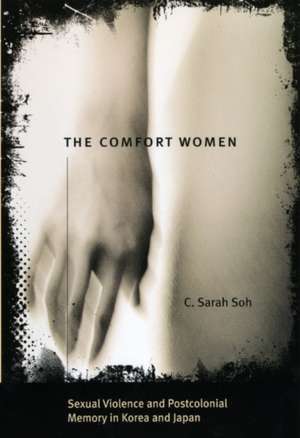The Comfort Women: Sexual Violence and Postcolonial Memory in Korea and Japan: Worlds of Desire: The Chicago Series on Sexuality, Gender, and Culture
Autor C. Sarah Sohen Limba Engleză Paperback – 15 feb 2009
In an era marked by atrocities perpetrated on a grand scale, the tragedy of the so-called comfort women—mostly Korean women forced into prostitution by the Japanese army—endures as one of the darkest events of World War II. These women have usually been labeled victims of a war crime, a simplistic view that makes it easy to pin blame on the policies of imperial Japan and therefore easier to consign the episode to a war-torn past. In this revelatory study, C. Sarah Soh provocatively disputes this master narrative.
Soh reveals that the forces of Japanese colonialism and Korean patriarchy together shaped the fate of Korean comfort women—a double bind made strikingly apparent in the cases of women cast into sexual slavery after fleeing abuse at home. Other victims were press-ganged into prostitution, sometimes with the help of Korean procurers. Drawing on historical research and interviews with survivors, Soh tells the stories of these women from girlhood through their subjugation and beyond to their efforts to overcome the traumas of their past. Finally, Soh examines the array of factors— from South Korean nationalist politics to the aims of the international women’s human rights movement—that have contributed to the incomplete view of the tragedy that still dominates today.
Soh reveals that the forces of Japanese colonialism and Korean patriarchy together shaped the fate of Korean comfort women—a double bind made strikingly apparent in the cases of women cast into sexual slavery after fleeing abuse at home. Other victims were press-ganged into prostitution, sometimes with the help of Korean procurers. Drawing on historical research and interviews with survivors, Soh tells the stories of these women from girlhood through their subjugation and beyond to their efforts to overcome the traumas of their past. Finally, Soh examines the array of factors— from South Korean nationalist politics to the aims of the international women’s human rights movement—that have contributed to the incomplete view of the tragedy that still dominates today.
Din seria Worlds of Desire: The Chicago Series on Sexuality, Gender, and Culture
-
 Preț: 216.05 lei
Preț: 216.05 lei -
 Preț: 275.78 lei
Preț: 275.78 lei -
 Preț: 228.38 lei
Preț: 228.38 lei -
 Preț: 245.12 lei
Preț: 245.12 lei -
 Preț: 397.23 lei
Preț: 397.23 lei -
 Preț: 269.93 lei
Preț: 269.93 lei -
 Preț: 292.46 lei
Preț: 292.46 lei -
 Preț: 276.94 lei
Preț: 276.94 lei -
 Preț: 319.06 lei
Preț: 319.06 lei -
 Preț: 390.87 lei
Preț: 390.87 lei -
 Preț: 275.19 lei
Preț: 275.19 lei -
 Preț: 260.64 lei
Preț: 260.64 lei -
 Preț: 260.44 lei
Preț: 260.44 lei -
 Preț: 221.63 lei
Preț: 221.63 lei - 16%
 Preț: 155.67 lei
Preț: 155.67 lei - 21%
 Preț: 485.64 lei
Preț: 485.64 lei - 12%
 Preț: 202.45 lei
Preț: 202.45 lei
Preț: 216.38 lei
Nou
Puncte Express: 325
Preț estimativ în valută:
41.40€ • 43.23$ • 34.19£
41.40€ • 43.23$ • 34.19£
Carte disponibilă
Livrare economică 25 martie-08 aprilie
Livrare express 08-14 martie pentru 29.51 lei
Preluare comenzi: 021 569.72.76
Specificații
ISBN-13: 9780226767772
ISBN-10: 0226767779
Pagini: 384
Ilustrații: 16 halftones, 4 maps, 1 line drawing, 2 tables
Dimensiuni: 152 x 229 x 22 mm
Greutate: 0.51 kg
Editura: University of Chicago Press
Colecția University of Chicago Press
Seria Worlds of Desire: The Chicago Series on Sexuality, Gender, and Culture
ISBN-10: 0226767779
Pagini: 384
Ilustrații: 16 halftones, 4 maps, 1 line drawing, 2 tables
Dimensiuni: 152 x 229 x 22 mm
Greutate: 0.51 kg
Editura: University of Chicago Press
Colecția University of Chicago Press
Seria Worlds of Desire: The Chicago Series on Sexuality, Gender, and Culture
Notă biografică
C. Sarah Soh is professor of anthropology at San Francisco State University and the author of Women in Korean Politics.
Cuprins
List of Plates
List of Figures and Tables
List of Maps
Prologue: An Anthropological Analysis
Acknowledgments
Note to the Reader
Introduction Gender, Class, Sexuality, and Labor under Japanese Colonialism and Imperialist War
PART 1 Gender and Structural Violence
Chapter 1. From Multiple Symbolic Representations to the Paradigmatic Story
Chapter 2. Korean Survivors’ Testimonial Narratives
Chapter 3. Japan’s Military Comfort System as History
PART 2 Public Sex and Women’s Labor
Chapter 4. Postwar/Postcolonial Memories of the Comfort Women
Chapter 5. Private Memories of Public Sex
Chapter 6. Public Sex and the State
Epilogue Truth, Justice, Reconciliation
Appendix: Doing “Expatriate Anthropology”
Notes
Bibliography
Index
List of Figures and Tables
List of Maps
Prologue: An Anthropological Analysis
Acknowledgments
Note to the Reader
Introduction Gender, Class, Sexuality, and Labor under Japanese Colonialism and Imperialist War
PART 1 Gender and Structural Violence
Chapter 1. From Multiple Symbolic Representations to the Paradigmatic Story
Chapter 2. Korean Survivors’ Testimonial Narratives
Chapter 3. Japan’s Military Comfort System as History
PART 2 Public Sex and Women’s Labor
Chapter 4. Postwar/Postcolonial Memories of the Comfort Women
Chapter 5. Private Memories of Public Sex
Chapter 6. Public Sex and the State
Epilogue Truth, Justice, Reconciliation
Appendix: Doing “Expatriate Anthropology”
Notes
Bibliography
Index
Recenzii
“This is a courageous, judicious, and well-written book that refuses to yield to knee-jerk responses or politically correct narratives, but rather insists on setting the comfort women within broader historical and cultural contexts. Sympathetic and sensitive, C. Sarah Soh nevertheless challenges both feminist and ethnic nationalist paradigms in an astonishing display of objectivity. The Comfort Women is a lucid, brave, and important work.”
"C. Sarah Soh’s study of ‘comfort women’ offers a close-grained yet compassionate analysis of this disturbing experience. She cogently deploys ethnography and history to illuminate a crucial case in gender and international issues.”
“This is a dispassionate, careful, well-researched, and brave book. Embedding her story in the whole history of prostitution and abusive treatment of women from the colonial period to the present, Soh shows that the comfort women system partook not just of the authoritarian politics of Japanese colonialism, but was also deeply rooted in a Korean patriarchy whose effects continued on after 1945. I expect this book will be the standard work on the subject for some time.”
"A brave and impressive book that usefully complicates and adds layers to our understanding of a sordid system."
“Since 1991, when Korean comfort women first stepped forward to demand compensation, much has been written about the Japanese military comfort system. Through careful anthropological work, Soh adds to knowledge about this system and provides a nuanced context within which to understand it. . . . In this courageous book, Soh succeeds in her aspiration to write against both adversarial ethnonationalisms and ahistorical international feminisms.”
"In just 200 pages, it answers a long unanswered question: that there were comfort women in Singapore during World War II, including local women – making the case that though no Singaporean women have come forward, people should not think they were exempt."










